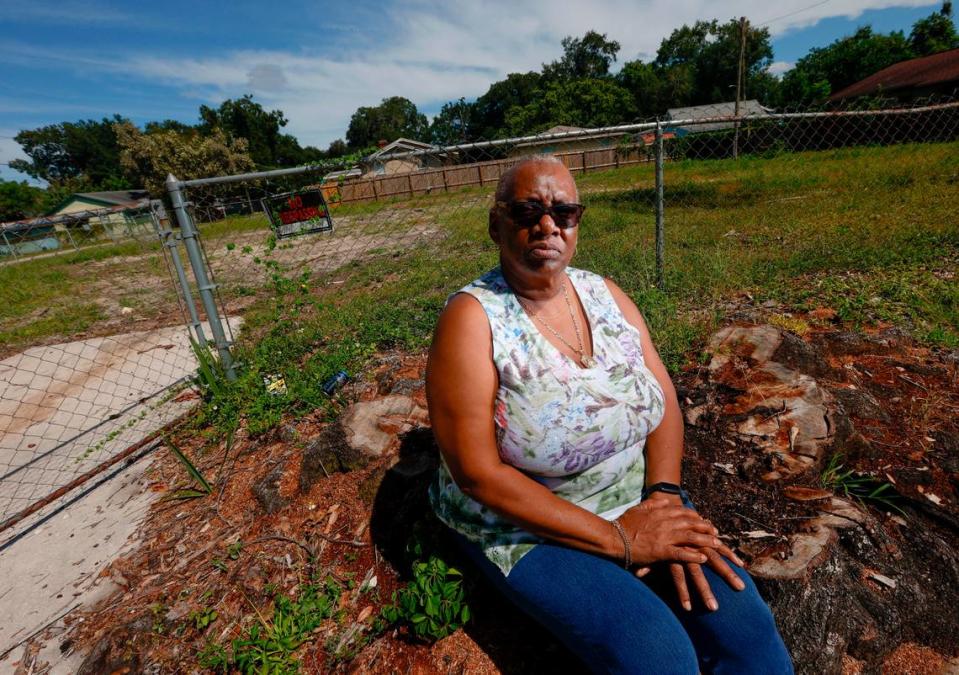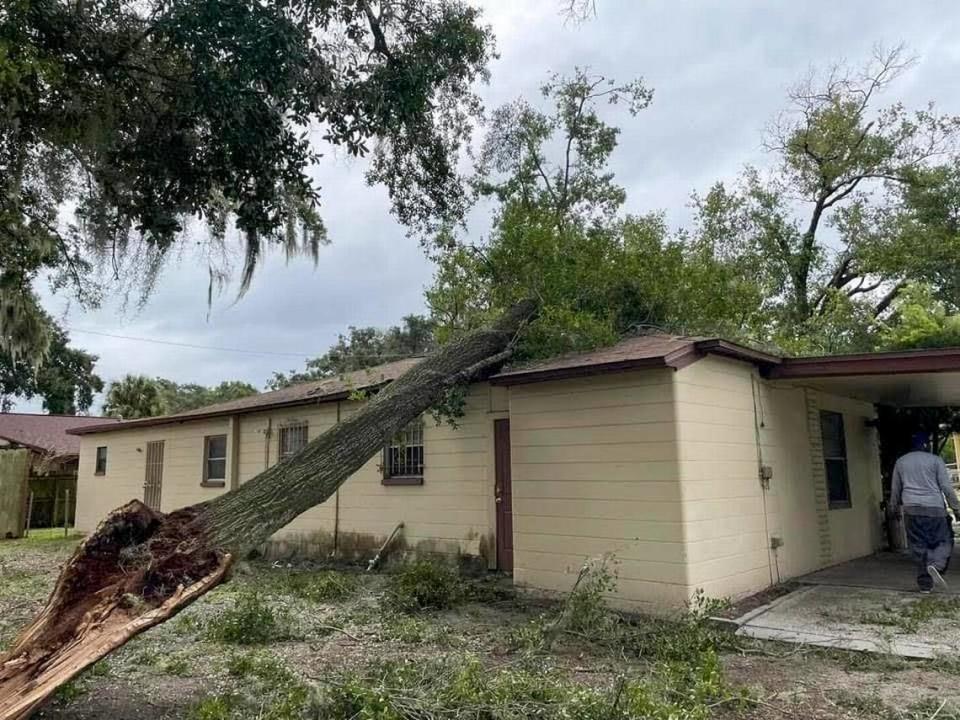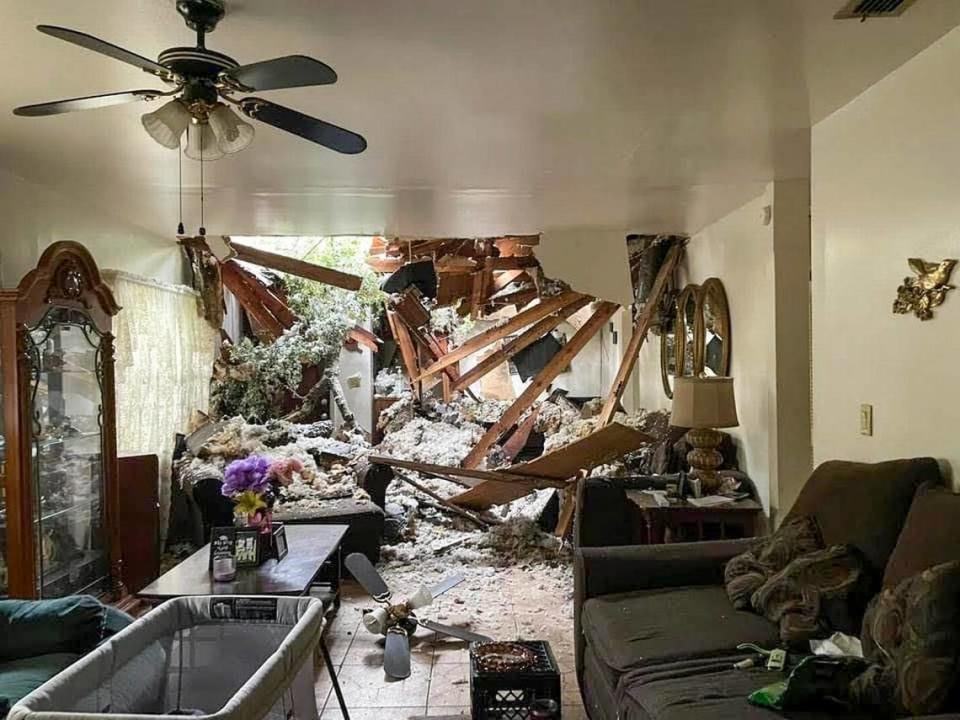Did lawsuits drive Florida’s insurance crisis? The evidence remains thin
- Oops!Something went wrong.Please try again later.
Barbara Glover narrowly missed being crushed by the oak tree that fell through her roof during Hurricane Ian last year.
As she fled her Tampa home of 35 years, clutching nothing but a duffel bag of clothes, she knew what to do next.
She called her insurance company, Universal Property and Casualty. And she waited for them to make her whole.
After months of feeling jerked around by the company and seeing her home condemned by the city, she took her case to court. In February, Glover became one of 4,571 people — 15 per day — to sue Universal this year.
As property insurance premiums rose to become a full-blown crisis for Floridians in recent years, the primary response by Gov. Ron DeSantis and state legislators is to stamp out those lawsuits.
But five years into the crisis, the evidence that lawsuits caused Floridians’ premiums to skyrocket and caused 13 insurers to go out of business hasn’t materialized.
Litigation has yet to be found to be the cause of a single insurance company failure. Despite cracking down on litigation, premiums are still going up, and the industry now says they won’t go down in the foreseeable future because of factors, such as climate change, that are out of their control.
Some lawmakers are now wondering when, if ever, they’ll see proof that what they voted for was effective.
“We’ve been getting more information from our federal government on UFOs in the past year than we have on insurance data from the state of Florida,” Sen. Jason Pizzo, D-Miami, told Insurance Commissioner Mike Yaworsky during a virtual town hall last month. Pizzo noted he voted for the bills over the years despite the litigation issue having “never been proven.”
Yaworsky, who was appointed by DeSantis in February, didn’t disagree.
“That’s a great way to frame it,” he responded.
Florida does have an extreme number of lawsuits against insurers compared to other states. Even plaintiffs’ lawyers and consumer advocates will admit some litigation against insurance companies is abusive or unnecessary. One law firm has been shut down for its practices.
But the Legislature hasn’t studied how many of those lawsuits are excessive and not triggered by legitimate grievances against the insurer.
State regulators also can’t give definitive answers about how much excessive or frivolous lawsuits have caused Floridians’ premiums to go up, compared to other factors.
“No one seems to be able to provide proof of it,” said Gavin Magor, director of research and ratings at West Palm Beach-based Weiss Ratings, which examines the financial health of every Florida-based insurer.
Instead, Florida insurers could be driving the litigation rate by trying to reduce payouts. The Florida-based insurers who dominate the market receive an outsize percentage of the nation’s complaints, and one company has been accused by its own adjusters of manipulating reports to lowball or deny homeowners’ claims.
For Glover, she says she didn’t want to have to sue her insurer. The company sent her checks totaling about $100,000 within a month, but without telling her what the money was for or how much the company estimated the damage, she said.
Her home hasn’t been inhabitable since the storm, and in April, the city condemned it, requiring her to tear it down to a slab. The company has still not paid the maximum under her policy provisions, which still wouldn’t be enough to rebuild.
In a statement, a spokesperson for Universal told the Times/Herald the company promptly paid her. As for the home being condemned, he noted the city’s notice said it was from “fire.” Glover’s lawyer, Scott Jeeves, says there was no fire, and the city made a mistake.
“The possibility of a fire loss to the home causing its demolition raises several new questions that will need to be explored in the litigation,” spokesperson Travis Miller said.
Glover said she was raised “old-school” and taught the three grandchildren she raised in her home that anything of value needed to be insured.
“How can I tell them that, when it looks like a big scam?”

Lots of lawsuits
For years, insurance companies, state regulators and many Republican lawmakers have blamed lawsuits for causing Florida’s crisis.
Those claims have been supported by the sheer number of lawsuits filed against insurers, and by one statistic in particular: the percentage of lawsuits compared to the rest of the country. A 2021 analysis by then-Florida Insurance Commissioner David Altmaier found that Florida made up 8% of the nation’s homeowners’ claims in 2019, but 76% of its lawsuits.
Although critics note the study didn’t include some data, such as Texas windstorm claims, the numbers have been difficult to refute.
Insurance companies point to some law firms filing hundreds of lawsuits per day against insurers — a pace insurers say is beyond reason. Some law firms are using targeted online advertising to find clients, observers allege.
So far, Florida officials have taken action against one law firm, operated by Coral Gables attorney Scott Strems, whose 30-lawyer office became the top law firm in the state for suing home insurance companies. The Florida Bar accused Strems of filing multiple claims on a suit and committing “fraudulent” conduct, and in 2020, the Florida Supreme Court suspended him.
DeSantis and the Legislature have tried to reduce the incentives for lawyers to take cases against insurers.
In 2021, lawmakers limited the ability of homeowners to assign their insurance benefits to a contractor, much like a patient assigns their benefits to a doctor’s office to directly bill their health insurance company.
After that move failed to reduce Floridians’ premiums, lawmakers this year took a more dramatic step. Undoing 130 years of state law, they stopped requiring insurance companies to pay attorney’s fees when plaintiffs sue and win.
For years, Republican leaders in the House of Representatives had resisted the move, believing that insurers’ claims were overblown. In March, former President Donald Trump blasted it as a “BAILOUT” for insurance companies.
There was a surge in lawsuits before the new laws took effect. In March, 156,652 more lawsuits were filed against all insurance companies, including auto insurance, compared to March 2022, according to the industry-backed Insurance Information Institute. Those additional lawsuits will increase insurers’ costs by 8%, the group estimates.
The decision was hailed by insurers and business groups as a historic win, however.
“The changes that the Legislature adopted were transformational,” said Locke Burt, a former state senator who runs Ormond Beach-based Security First Insurance Co.
About 10% of his company’s claims are represented by a lawyer, but many of those claims are settled before a lawsuit is formally filed, he said. He calculates that litigated claims cost his company 20 cents of every premium dollar, and he hopes that rate will be cut in half. (Reinsurance is the biggest cost, at between 30 to 40 cents, he said.)
However, he said insurance companies are not without fault.
“I believe that an insurance company’s litigation rate is directly related to how it handles its customers,” Burt said.

Lawmakers haven’t studied crisis
The state’s insurance crisis started in 2017 when its 12-year streak of storm-less years ended, but the Legislature has done no studies of the factors causing the crisis.
In 2021, lawmakers required state regulators to start collecting from insurers more detailed data on lawsuits, but the first results won’t be released until the end of this month, Yaworsky told senators last week.
The release has been held up in part because when insurance companies were first required to report details on their lawsuits, 71% of them submitted no data and another 18% missed the deadline.
In 2020, Florida Insurance Consumer Advocate Tasha Carter surveyed 7,000 people whose claims were represented by a lawyer. The survey found that 78% of them said they hired a lawyer because of a poor claims experience, either from their insurer delaying payments, denying payments or not offering enough money. Another 20% said they hired a lawyer based on advice from a contractor, a consultant or an insurance adjuster.
“These types of marketplace behaviors and claim handling practices can lead to litigation,” Carter told lawmakers in 2021.
Florida law used to allow insurance claims to be filed up to three years after the date of the loss. Insurance companies have blamed contractors for going door to door and convincing homeowners that damage to their roofs or homes was caused by storms that happened months or years earlier. In response, lawmakers last year changed the deadline to file a claim to one year after the incident.
But Carter’s survey found that those instances might be in the extreme minority. About four out of every five claims were filed within two weeks of the date of the loss, she found.
Carter mentioned her findings in a presentation to the House Insurance and Banking Subcommittee in 2021. Carter didn’t give a similar presentation to the Senate’s Banking and Insurance Committee, however. Her spokesperson said the survey was sent to “legislators, consumers and other stakeholders.”
Former Sen. Jeff Brandes, R-St. Petersburg, who served on the committee, said he had not seen it, and neither did other lawmakers, industry lobbyists and observers.

Is bad behavior driving litigation?
Evidence of poor claims-handling practices by Florida’s insurance companies have been mounting in recent years. Unlike other states, Florida’s insurance market is dominated by small companies, many of which outsource their claims handling to third parties, especially after storms.
Some insurance companies have been accused of deliberately low-balling homeowners claims.
In August, an appellate court led by a DeSantis-appointed judge wrote that evidence in one homeowner’s lawsuit “reasonably” demonstrated that Boca Raton-based Florida Peninsula Insurance Co. removed words from her policy to deny her claim. The company said it was an accident.
Over the last year, at least eight adjusters working for St. Petersburg-based United Property and Casualty, which is now insolvent, alleged the company was manipulating their reports to deliberately reduce or deny homeowners’ claims. The Department of Financial Services is investigating.
While Florida insurers receive a disproportionate share of lawsuits compared to other states, they also receive an outsized share of the complaints, according to an analysis of National Association of Insurance Commissioners filings by the American Policyholder Association.
The association found that the top 15 Florida insurers make up 6% of the nation’s premiums but 52% of the nation’s complaints.
While lawmakers were passing the tort reform measures this year, they also passed a law, advocated by Yaworsky, requiring insurers to adopt best practices for handling claims and increasing the penalties for insurers that mishandle claims.
During a Senate Committee hearing last week, Yaworsky said he keeps hearing complaints from Floridians upset with how their claims were handled.
“I’ve sometimes been surrounded by consumers,” he said.
Litigation not the cause of insolvencies
Despite the prevalence of litigation, it has yet to be cited as the cause of any insurance company failure in the last 15 years.
Instead, state-produced reports about company insolvencies have put the blame on excessive or unusual payouts to affiliated companies and officers.
Companies were cited for “stripping the company of cash,” paying more than $1 million in dividends to investors or making payments to affiliates that were not approved by state regulators.
The CEOs of Florida-based insurers were some of the highest-paid property insurance executives in the nation in the last decade, with one earning more than twice what the CEO of State Farm made.
Those insolvency reports are produced by the Florida Department of Financial Services’ Division of Rehabilitation & Liquidation. In the division’s most recent annual report, it notes nine “factors” for the 15 companies that went insolvent in the prior five years.
The factors include “improper management” and “inappropriate transactions with affiliates or subsidiaries.” It does not mention lawsuits or litigation.
Kenneth Klein, a former defense lawyer and professor at California Western School of Law, gave a presentation to the National Association of Insurance Commissioners last year about how there was a lack of evidence for litigation having a material effect on rising premiums.
In an interview, Klein suggested that Florida’s small insurers, which dominate the market, are too concentrated in the state to absorb storm risk. One of the few options to control costs is to be more aggressive about how they handle claims, which can lead to more lawsuits.
“It becomes a cycle that feeds on itself,” Klein said.
Insurance companies have pushed four times since the 1970s to block lawsuits across the country, said Joanne Doroshow, executive director of the Center for Justice & Democracy at New York Law School. Her organization has studied those efforts, and after each one, premiums didn’t go down, she said.
“This is a pattern that goes on in this country,” she said.

